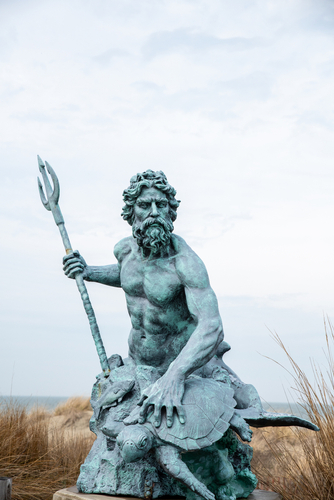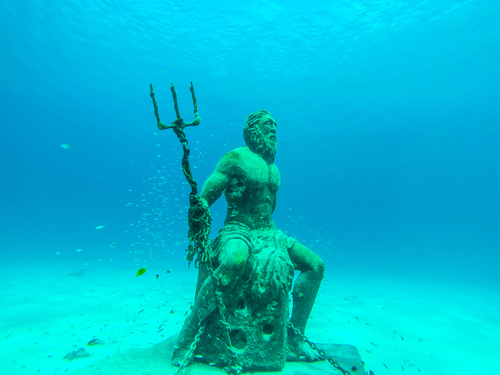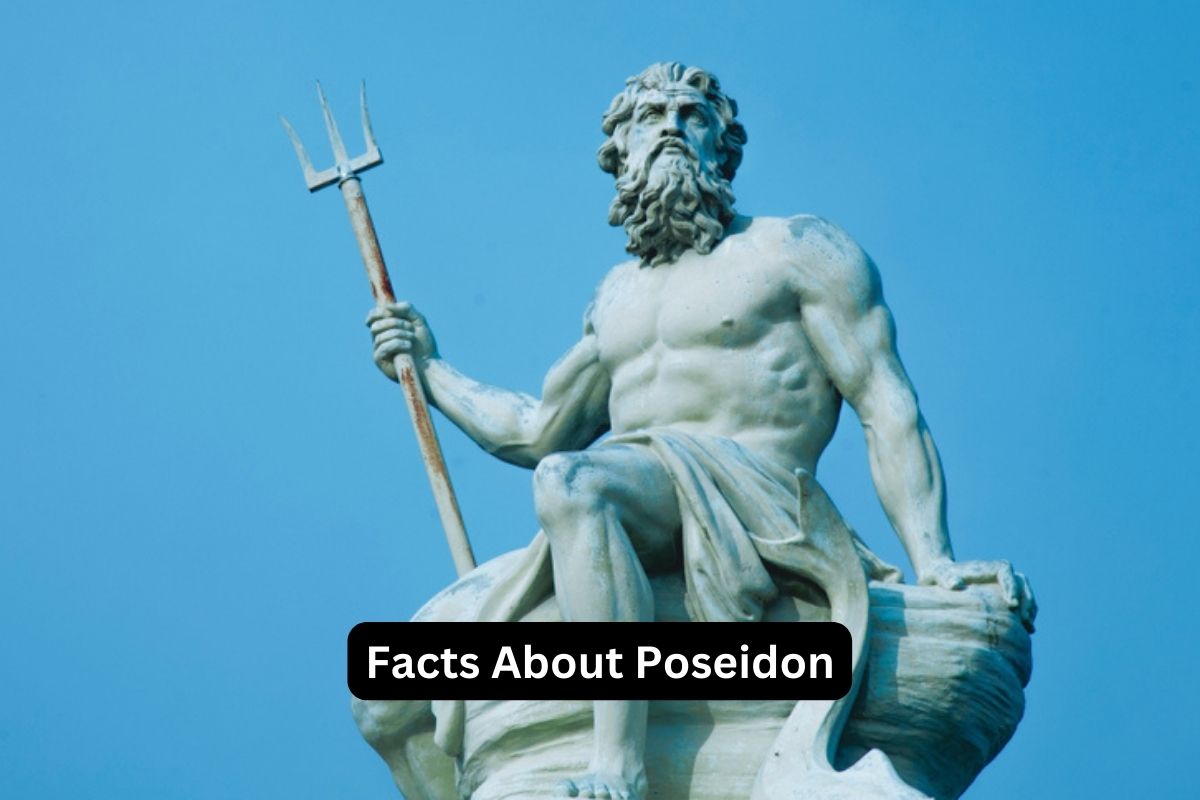Poseidon, a prominent figure in Greek mythology, is known as the god of the sea, earthquakes, and horses. As one of the twelve Olympian gods, he holds significant power and influence over the natural world.
Often depicted as a bearded man wielding a trident, Poseidon commands the waves, storms, and tides, making him a deity to be revered and feared by sailors.
His association with marine creatures, such as dolphins and fish, emphasizes his role as their protector. Poseidon’s temperamental nature is reflected in his ability to unleash destructive storms and earthquakes when angered.
Furthermore, his rivalry with Athena led to a pivotal mythological event in the creation of the city of Athens. Despite his sometimes tumultuous nature, Poseidon’s iconic chariot and horses demonstrate his dominion over both land and sea.
Throughout the ancient Greek world, temples and sanctuaries dedicated to Poseidon served as centers of worship and pilgrimage, attesting to his enduring significance and power.
Poseidon Facts
1. Poseidon is the Greek god of the sea, earthquakes, and horses
In Greek mythology, he was revered as one of the most influential and powerful deities. His dominion over the sea made him a crucial figure for sailors and fishermen who depended on his favor for safe voyages and bountiful catches.
Also Read: Facts About Zeus
As the god of earthquakes, Poseidon held the power to cause and control seismic activity, making him a force to be reckoned with on both land and sea.
Additionally, Poseidon’s association with horses showcased his connection to the natural world, as he was believed to have created horses and held great expertise in equestrian matters.

2. He is one of the twelve Olympian gods
After the Olympian gods emerged victorious in the Titanomachy, a war against the Titans, the world was divided among the three ruling brothers: Zeus, Poseidon, and Hades.
Poseidon claimed rulership over the vast seas and all water bodies, establishing himself as one of the central figures of the divine hierarchy.
Also Read: Aphrodite Facts
As an Olympian god, Poseidon held immense power and influence, and his role in Greek mythology extended far beyond his domain.
3. Poseidon is often depicted as a bearded man with a trident
Iconography played a significant role in ancient Greek religion and art, and the representation of Poseidon with a distinctive appearance held symbolic meaning. Poseidon’s long beard was a symbol of wisdom and authority, highlighting his status as a powerful deity.
The trident, a three-pronged spear-like weapon, is his primary attribute and serves as a visual representation of his authority over the sea.
It symbolizes his ability to command the forces of nature, control the waves, and strike the earth to cause earthquakes. The trident is also associated with his power to create springs and water sources, emphasizing his role as a deity of water.
4. He controls the waves, storms, and tides
Poseidon’s dominion over the sea encompasses a wide range of natural phenomena. He is believed to have the power to stir up or calm the waves, creating both calm seas and treacherous storms.
Sailors and seafarers often prayed to Poseidon for favorable weather conditions and protection during their journeys.
Additionally, Poseidon’s influence extends to the tides, which are caused by the gravitational forces between the Earth, Moon, and Sun. The ebb and flow of tides were attributed to his control, highlighting his authority over the vast waters.
5. Poseidon is associated with marine creatures and is their protector
As the god of the sea, Poseidon is closely linked to the creatures that inhabit it. He is often depicted surrounded by or riding alongside dolphins, fish, and other marine animals.
These creatures are considered sacred to him, and he is responsible for their well-being and protection. Sailors and fishermen often invoked Poseidon’s favor to ensure fruitful fishing trips and to avoid encounters with dangerous sea creatures.

6. He played a role in the creation of the city of Athens
Poseidon’s rivalry with Athena, the goddess of wisdom, led to an important mythological event in the formation of Athens. According to the legend, the two deities vied for the patronage of the city.
Poseidon struck the ground with his trident, causing a saltwater spring to gush forth. However, Athena, in her bid to win the city’s favor, planted an olive tree, a symbol of peace and prosperity.
The citizens of Athens chose Athena’s gift over Poseidon’s, and thus she became the city’s patroness. This myth highlights the significance of Athena’s wisdom and civilization over Poseidon’s more tempestuous and wild aspects, reinforcing the values and ideals embraced by the Athenians.
7. Poseidon had a violent temper and could unleash powerful storms and earthquakes
In Greek mythology, Poseidon was known for his quick temper and his propensity to react fiercely when provoked or offended.
His anger could result in catastrophic consequences, as he had the ability to summon devastating storms at sea and unleash destructive earthquakes on land.
These displays of power were seen as a reflection of his volatile and unpredictable nature, instilling both fear and respect among mortals.
8. He is often depicted riding a chariot pulled by horses
Poseidon’s association with horses is a prominent aspect of his character. He is commonly depicted in art and literature riding a magnificent chariot that is pulled by magnificent horses.
These horses are often depicted as sea creatures, such as hippocampi, which are mythical creatures with the upper body of a horse and the lower body of a fish. Poseidon’s chariot and horses symbolize his authority and control over both the land and sea, showcasing his power and dominion.
9. Poseidon was married to Amphitrite and had many children, including Triton and Theseus
Amphitrite, a sea nymph, became Poseidon’s wife and queen of the sea. Together, they had numerous children who played significant roles in Greek mythology. Triton, their son, is often depicted as a merman with the upper body of a human and the lower body of a fish.
He served as a messenger of the sea and possessed the ability to control and calm the seas. Theseus, another notable child of Poseidon, was a renowned hero in Greek mythology who undertook epic quests and played a crucial role in the founding of Athens.
10. Temples and sanctuaries dedicated to Poseidon existed throughout the ancient Greek world
Poseidon held a prominent place in the religious and cultural practices of ancient Greece. Numerous temples and sanctuaries were built in his honor, serving as places of worship and pilgrimage.
One of the most famous temples dedicated to Poseidon was the Temple of Poseidon at Cape Sounion in Greece. This majestic structure was situated on a cliff overlooking the Aegean Sea and served as a landmark for sailors.
It offered a breathtaking view and was a site of religious ceremonies and offerings dedicated to Poseidon. These sanctuaries and temples were important centers of devotion and demonstrated the reverence and importance placed on Poseidon in ancient Greek society.
